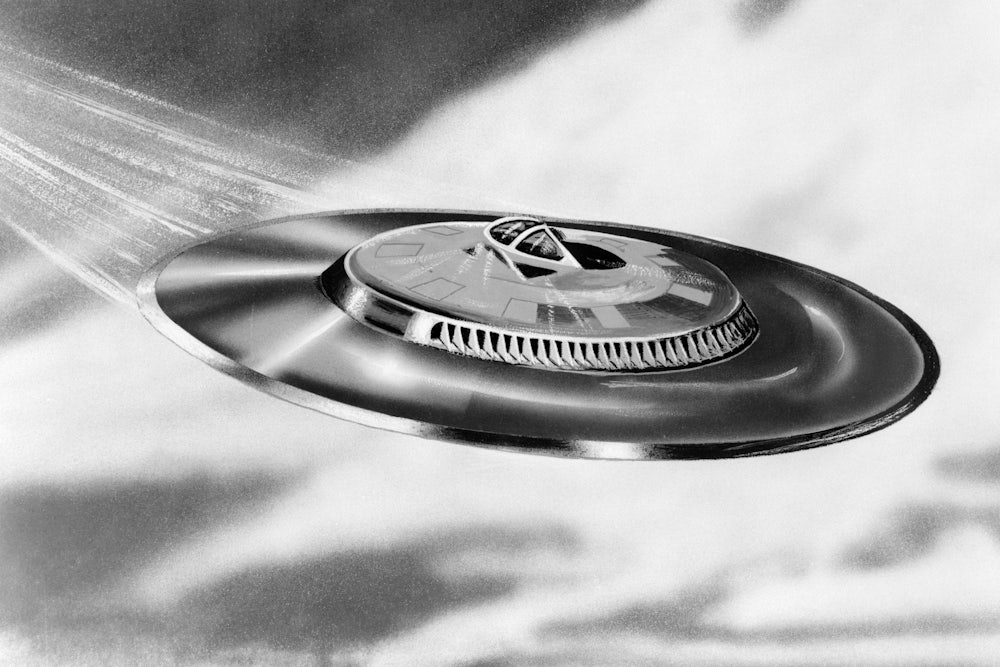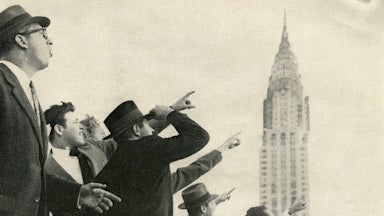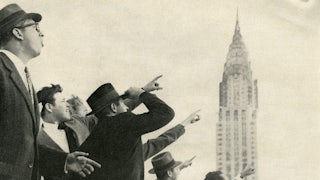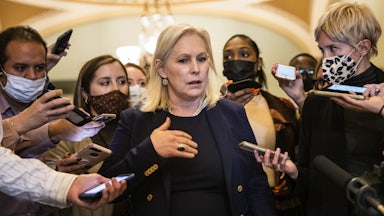The Republican-controlled House of Representatives has been holding a lot of oddball hearings lately: on whether President Joe Biden is a criminal, on whether Homeland Security Secretary Alejandro Mayorkas should be impeached, on whether criticizing an antisemitic remark by Robert Kennedy Jr. constitutes censorship, and so on. Amid all this hyperpartisan performance art, you may have missed a deeply weird hearing last week about little green men.
OK, it wasn’t literally about little green men. But it might as well have been. On July 26, the House Oversight’s National Security subcommittee on National Security, the Border, and Foreign Affairs, chaired by Representative Glenn Grothman, Republican of Wisconsin, held a hearing on “Unidentified Anomalous Phenomena,” UAP being the euphemism du jour for unidentified flying objects, or UFOs, which from the late 1940s until quite recently was itself a euphemism for flying saucers.
“When I was younger, in school,” Grothman reminisced at the hearing’s start, “I read a book, a 1966 book called Flying Saucers—Serious Business, and for a while, when I was a little bit younger, I thought it was the most important issue out there.” Representative Tim Burchett, a Tennessee Republican, further pointed out that some of his House colleagues “have even confided to me that they’ve had UFO sightings of their own. Those members, of course, some of them wish to remain anonymous, and I’ll keep it that way.”
Unlike Republican efforts to take out Biden or Mayorkas or to boost at Biden’s expense the Democratic candidacy of RFK Jr. (who, unsurprisingly, finds a recent account of extraterrestrial encounters “very credible”), UFO mania is not confined to Republicans. If anything, it seems to have gotten its start from Democrats.
I blame John Podesta, who was chief of staff to President Bill Clinton, counselor to President Barack Obama, chairman of Hillary Clinton’s presidential campaign, and founder of the Center for American Progress, perhaps the most influential liberal think tank in Washington. Podesta is a UFO-head of long standing. In a foreword to a 2010 book titled UFOs: Generals, Pilots, and Government Officials Go on the Record, Podesta described himself as “someone interested in the question of UFOs” and opined that “the time to pull the curtain back on the subject is long overdue.”
Podesta’s association with the book and its author, Leslie Kean, almost certainly helped persuade The New York Times to publish, in 2017, a page-one news story based on Kean’s reporting. Kean even got a byline on the story, along with the Times’ Helene Cooper and Ralph Blumenthal, a retired Timesman, a friend of Kean’s, and a fellow UFO-head. (I’m indebted here to a pioneering May 2021 New Republic story by Jason Colavito, “How Washington Got Hooked on Flying Saucers”; see also Colavito’s December 2021 follow-up, “Congress Is About to Send the Pentagon on a Wild Flying-Saucer Chase.”)
The 2017 Times story was mostly a straight-ahead investigative piece revealing the existence of an Advanced Aerospace Threat Identification Program created at the behest of then–Senate Majority Leader (and Democrat!) Harry Reid of Nevada. (“My staff warned me not to be seen to engage on the topic,” Reid would recall in a 2021 op-ed, also in The New York Times, headlined “What We Believe About UFOs.” He ignored them.) But the 2017 Times story also described, uncritically, “footage from a Navy F/A-18 Super Hornet showing an aircraft surrounded by some kind of glowing aura traveling at high speed and rotating as it moves.” As Art Levine pointed out in a comprehensive skeptic’s review of Washington’s UFO moment (“Spaceship of Fools”), published last week in The Washington Spectator, pilot sightings, on which Kean’s book is heavily reliant, are notoriously unreliable. By one expert calculation, pilots misperceive airborne objects nearly 90 percent of the time, a much poorer record than that of people standing on terra firma. “Pilots are susceptible to overinterpretation, especially of vague, rapid, and unclear experiences,” according to Ronald Fisher, a lecturer at Miami’s Florida International University. The Times made no mention of this well-documented tendency.
Reid’s Advanced Aerospace Threat Identification Program closed shop in 2012, but, prodded in part by widespread attention to the 2017 Times story, Congress in 2020 created a successor agency, the Unidentified Aerial Phenomenon Task Force. In 2021 the Defense Department created the Airborne Object Identification and Management Synchronization Group, and in 2022 (after The New Yorker lent its own imprimatur to the UFO craze), that was given more money and renamed the All-Domain Anomaly Resolution Office. Also in 2022, NASA created a study team on UFOs.
Meanwhile, UFOs have been the subject of no fewer than three congressional hearings. Under the Democrats last year, a House intelligence subcommittee held the first congressional hearing on UFOs since 1966, when then-Representative Gerald Ford chaired one. (Ford was a serious UFO-head.) The Democratic Senate followed up with an Armed Services subcommittee hearing. And last week the House Oversight subcommittee chimed in.
UFOs are fast becoming the most-studied topic in American governance. The conclusion of every government agency assigned to look at this question is the same: While it is certainly possible that life exists somewhere else in our unimaginably vast universe, not a single instance of human observation of or contact with extraterrestrial life has ever been substantiated. The proliferation of government agencies to examine this question guarantees a proliferation of government reports repeating this finding.
That doesn’t mollify UFO-heads, of course. They just take it as evidence that the government is covering something up. The star witness at last week’s UFO hearing was a former military intelligence official and self-styled whistleblower named David Grusch, who in 2019–21 was detailed to the Unidentified Aerial Phenomenon Task Force. At the hearing, Grusch said that there’s a secret government program to retrieve, examine, and re-engineer extraterrestrial aircraft that have crash-landed in the United States; that “biologics [i.e., the remains of nonhumans] came with these recoveries”; that people have been harmed in order to cover this up; and that (he hinted) some of these truth-tellers have been murdered (“I have to be careful [answering] that question; I directed people with that knowledge to the appropriate authorities”).
The Pentagon said these allegations are not true: to wit, it “has not discovered any verifiable information to substantiate claims that any programs regarding the possession or reverse-engineering of extraterrestrial materials have existed in the past or exist currently.”
I’m all for skepticism about whatever the Pentagon says, and about received wisdom in general. But how about applying some skepticism to the UFO-heads? As Colavito and Levine have amply documented, a lot of them occupy a pretty sketchy subculture. At the hearing, Grusch wouldn’t name anyone with direct knowledge of the government UFO retrieval program, nor any of the government agencies involved (though he offered to share such information in private with inquiring House members). With claims as fantastic as these, isn’t the burden of proof on Grusch? “He has not presented anything like the evidence we would expect,” Garrett Graff, author of a forthcoming book about the government’s search for UFOs, told The Guardian. Indeed, Levine notes, one of Grusch’s allegations—not mentioned at the hearing—was that Benito Mussolini recovered “a partially intact vehicle” from outer space in 1933 in Magenta, Italy, and that Pope Pius XII alerted the United States. This, Levine writes, is a “long-discredited hoax.” Graff said other aspects of Grusch’s story echo UFO myths dating to the 1970s and 1980s.
In the past, people who told tales of UFO sightings without substantiation were ridiculed. Now such mockery is deemed out of bounds. It just isn’t done. “You have to convince the audience today,” admonished then–subcommittee Chairman André Carson, Democrat of Indiana, at the 2022 House hearing, “and most especially our military and civilian aviators, the culture has changed, that those who report UAPs be treated as witnesses, not as kooks.”* Senator Kirsten Gillibrand sounded a similar note at an April UFO hearing by an Armed Services subcommittee, decrying the “UFO stigma.”
But there’s no tangible reason to treat UFO stories any differently today than we did four decades ago, when Steve Martin joked on Saturday Night Live about a “big whirly thing come down out of the sky.” Fringe tabloid culture has migrated to the internet, and politicians are terrified that if they dismiss it, they’ll be branded elitist. Polls have always shown the public was inclined to believe in flying saucers, but that belief appears to be more widespread now. The press takes UFOs seriously because they’re good for ratings and for online clicks, and lurking in the back of everyone’s mind is that if you call flying-saucer stories bunk you’ll insult the working class, at the moment the most contested constituency in American politics. That’s nonsense. It’s condescension disguised as open-mindedness, and I guarantee you the proletariat will notice the difference.
Is there another advanced civilization lurking out there in the great beyond? Very possibly. It’s an exciting (if somewhat terrifying) idea. But a century of people telling stories about alien encounters and flagging photographs and videos of indistinct objects in the sky has failed to produce a single item of persuasive evidence to demonstrate that such things really happened. Is it because our government has kept it secret? If we’ve learned anything during the past century about the United States, it’s that, especially after any passage of time, our government is extremely bad about keeping anything secret. That evidence about something as momentous as an alien encounter could be long suppressed is especially far-fetched. The alternative circumstance, that crackpots and mountebanks might claim such evidence exists, then fail to produce any, is, on the other hand, entirely plausible and familiar. The only true revelation in this UFO moment is that Congress and the press have become so much more susceptible to being manipulated by these clowns.
* This article originally misstated the date of the hearing.










